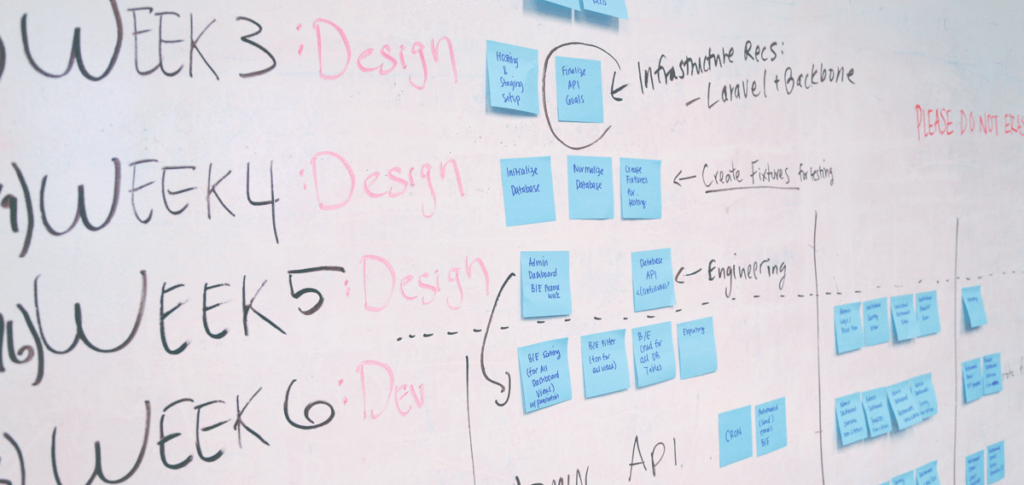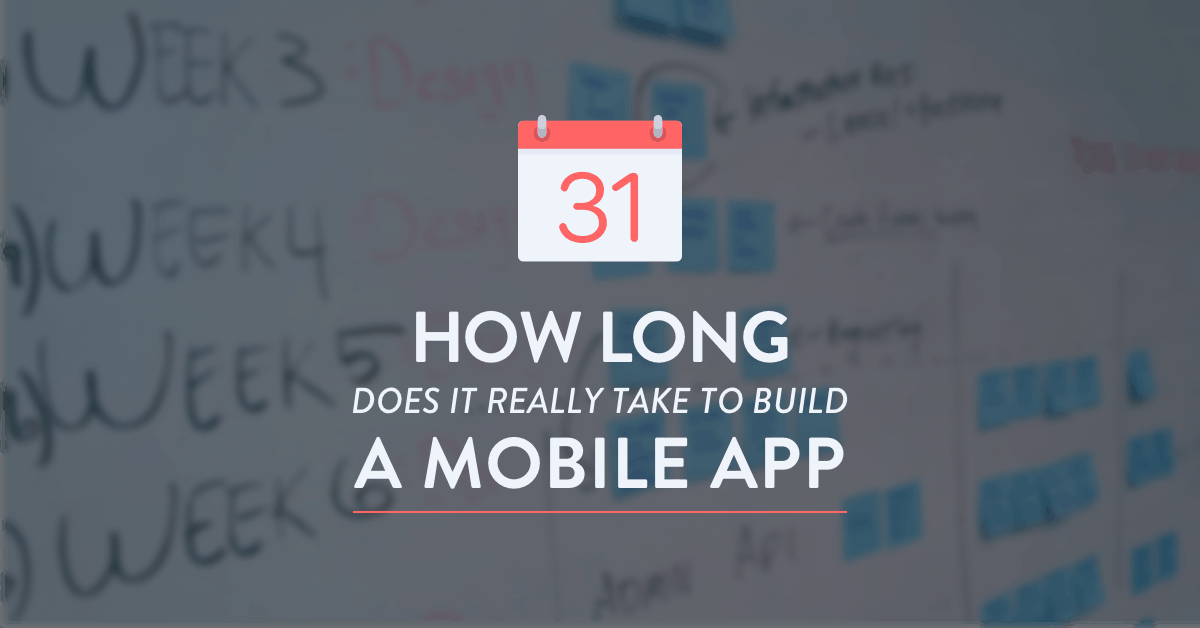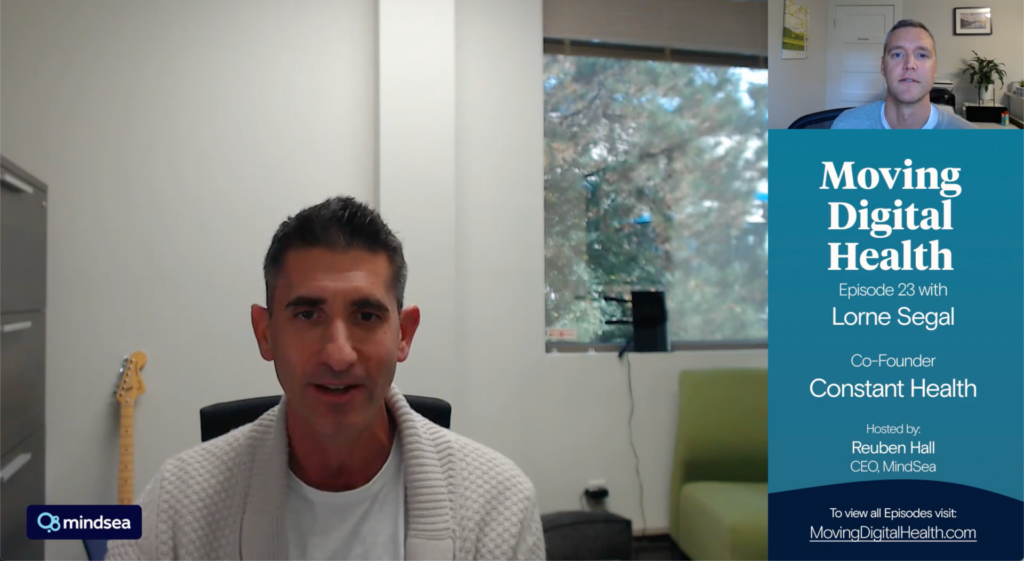
When it comes to scheduling projects or determining timeframes, there’s a famous business idiom you might have heard (especially if you’ve ever worked in or contracted an agency): “how long is a piece of string?”
How about ‘how long does it take to build an app?’
Figuring out how long it takes to build an app will depend of a variety of factors – but in our experience, how long it will take to build an app is a question of knowing what resources you’ll have access to, the scope of what you’re trying to build, and what skill levels you’ll be able to leverage during the process.
To clarify – let’s start by talking about your ‘minimum viable product’ (MVP) and the creativity and code that goes into bringing it to life.
A mobile development agency like ours will typically tell our clients it’ll take between 12 and 16 weeks to build their MVP from strategy and envisioning, to live release in the App Store. That’s not to say our team hasn’t worked faster – or worked longer – depending on the project, but this is the average time it takes to build something worthwhile.
And the word ‘worthwhile’ is key. Literally hundreds of thousands of apps on Android and iOS are downloaded and immediately deleted. You’ve probably encountered a few of these. There’s something just a little off about the whole user experience with these apps. They’re too complicated, not pro enough, or just too buggy to bother – the kind of apps that feel slapped together haphazardly- they betray their creators’ lack of experience.
By contrast, apps like Facebook, Instagram and WhatsApp are so ubiquitous, so usable, we barely notice how well they’ve integrated into our daily routines – or how long we spend transfixed by them. Facebook in particular has done this so well, oftentimes you don’t realize you’re not reading a news article on safari, you haven’t actually left the app.
Beautiful, intuitive interface design, and seamless, indispensable user experiences are the hallmarks of any quality app, and quality takes time.
Any guesses as to how long it took Facebook to achieve this balance?
Alright – I know you’re not Facebook!
Who could be?
They have hundreds of developers and designers working full time on the app, all day, every day – and countless more have gone into its development up to this point. How can anyone expect to start at that level?
But the point remains – if you want to make a great app, it’s not going to happen overnight.
Here’s a breakdown of the factors you can expect will influence your overall timeline:
Know your technical wants and realities.
Do you have an existing website or internet-of-things product to integrate with the app? Where will the app get its content or data? Are you providing peer-to-peer features like chat? How big and/or complex is your functionality? Will you need server hosting? Analytics? Do you have a basic understanding of how development works or even a Chief Technical Officer (CTO)?
A development agency will need to know the depth of your technical needs to figure out how much they’ll need to problem-solve for you with your MVP specifically. This might require up front technical investigations into the possibilities and/or even feasibility.
Know who you need on your team.
Are you already technical and can code for yourself? Just need design or product strategy help? Or are you an entrepreneur with an idea, and you need help with the entire end-to-end execution?
If hiring and ‘owning’ your app-building talent in house is part of your business strategy in developing your MVP, then you’ll need to factor in the time it takes to hire and train your team. However, if time to market (TTM) is your biggest concern, approaching an app development agency who can assign a full time to work full time on your project and really crank it out might be the best call.
Wondering what the difference is between building an in-house mobile app development team or outsourcing it to an agency? Click here to learn more.
Know that it always takes longer than you think it’s going to take.
Unforeseen circumstances like new iOS releases or third party integration changes, or unexpected problems that arise during quality testing might extend your timeline. Give yourself a buffer rather than a drop-dead deadline to complete the app. The last thing you want is to release a product to the App Store that’s broken, buggy or worse. You only get one chance to make a first impression, and you don’t want to be one of those apps that are downloaded and immediately discarded.
Know your product roadmap.
The most important thing to understand when asking how long it will take to build you app, is knowing the job isn’t over when you release your MVP to the App Store – it’s just a first step. There are a number of reasons to enhance and improve your app over time. You might want to satisfy new expectations and wants from your audience, or take advantage of new technologies and smartphone functionality, or even incorporate new business realities, models or offerings. All of these things should be part of your long term plan for the app – even an idea when or at least what market realities might make you consider ‘retiring’ the product someday.
A great app agency should help you develop and plan your product beyond the MVP and well into the future, with a breakdown of what features you’ll include in future releases and how those align to your business goals.
Click here to see how we plan product roadmaps with the MindSea Blueprint Process.
I say this often: apps aren’t a one-and-done. How long it takes to build one is largely only limited – or dictated – only by your vision for what you want to create. If you create an amazing app that becomes a success – you may never actually be done building it. Reach out to me to see how long it might take to build your app.



